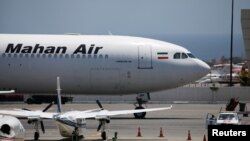The U.S. government has imposed new sanctions against two companies based in the United Arab Emirates (UAE) for providing material support to Iran’s biggest airline.
The U.S. Treasury Department said Wednesday the two companies, Parthia Cargo and Delta Parts Supply FZC, have provided parts and logistic support to Iranian airline Mahan Air, which is blacklisted under U.S. sanctions.
The Treasury Department also imposed sanctions on UAE-based Iranian national Amin Mahdavi for owning or controlling Parthia Cargo.
“The Iranian regime uses Mahan Air as a tool to spread its destabilizing agenda around the world, including to the corrupt regimes in Syria and Venezuela, as well as terrorist groups throughout the Middle East,” Treasury Secretary Steven Mnuchin said Wednesday in a statement. “The United States will continue to take action against those supporting this airline.”
The services provided by Parthia Cargo and Delta Parts Supply FZC helped Mahan Air to carry out activities in support of Tehran’s harmful agenda, including “the transportation of terrorists and lethal cargo to Syria” in support of President Bashar al-Assad’s regime, the Treasury said.
Iran has been a major backer of the Assad regime since the outbreak of Syria’s civil war in 2011.
Criminal charges
Mahdavi, 53, and his company were charged in a U.S. District Court with participating in a criminal conspiracy to violate U.S. export laws and sanctions against Iran.
“Iran evades the U.S. embargo resulting from their malicious activities with the collaboration of those who pose as innocent buyers, but who are ready to send the products on to their forbidden destination,” Assistant Attorney General for National Security John C. Demers said Wednesday in a statement.
“These charges against Parthia Cargo LLC and its managing director should put on notice all freight forwarders and others who facilitate illicit transshipments to Iran that their conduct will not be tolerated,” he added.
The criminal complaint against Mahdavi says he facilitated the illegal shipment of U.S.-manufactured goods to Iran. If convicted, Mahdavi would face up to five years of imprisonment and a fine of up to $250,000, and his company would face a fine of up to $500,000.
Behnam Ben Taleblu, a senior fellow at the Foundation for Defense of Democracies in Washington, says this development puts “the spotlight not just on continued Iranian procurement in service of sanctioned entities, but on Iran’s preference for using carve-outs like the UAE, as well as jurisdictions of weak central authority, to bust sanctions.”
“These circumvention efforts are aimed at supplying Iran with whatever commodity it needs to outlast sanctions until, of course, they are exposed and shut down,” he told VOA.
Maximum pressure
The latest designations are part of the continued U.S. “maximum pressure campaign” against Iran since the U.S. withdrawal from the 2015 Iran nuclear deal in May 2018.
The U.S. considers Iran a rogue state and says its sanctions against Tehran are a response to Tehran’s destabilizing role in the Middle East.
“One school of thought behind targeted sanctions is that the more common the exposure of bad and illicit behavior becomes, the harder it is for actors to continue this sort of work,” analyst Ben Taleblu said.
For Iran, “the more Washington disrupts Iranian procurement efforts through publicity, lawfare, and economic pressure, the more time and resources Iran will have to spend doing this, and for marginal returns,” he added.
The U.S. has been advocating for a return of all U.N. sanctions on Iran after the U.N. Security Council rejected a U.S. proposal to extend an arms embargo on the Iranian government.
President Donald Trump said Wednesday the U.S. will seek a “snapback” of all international sanctions on Iran at the United Nations, one week after Security Council members decided against extending an expiring arms embargo beyond mid-October.






